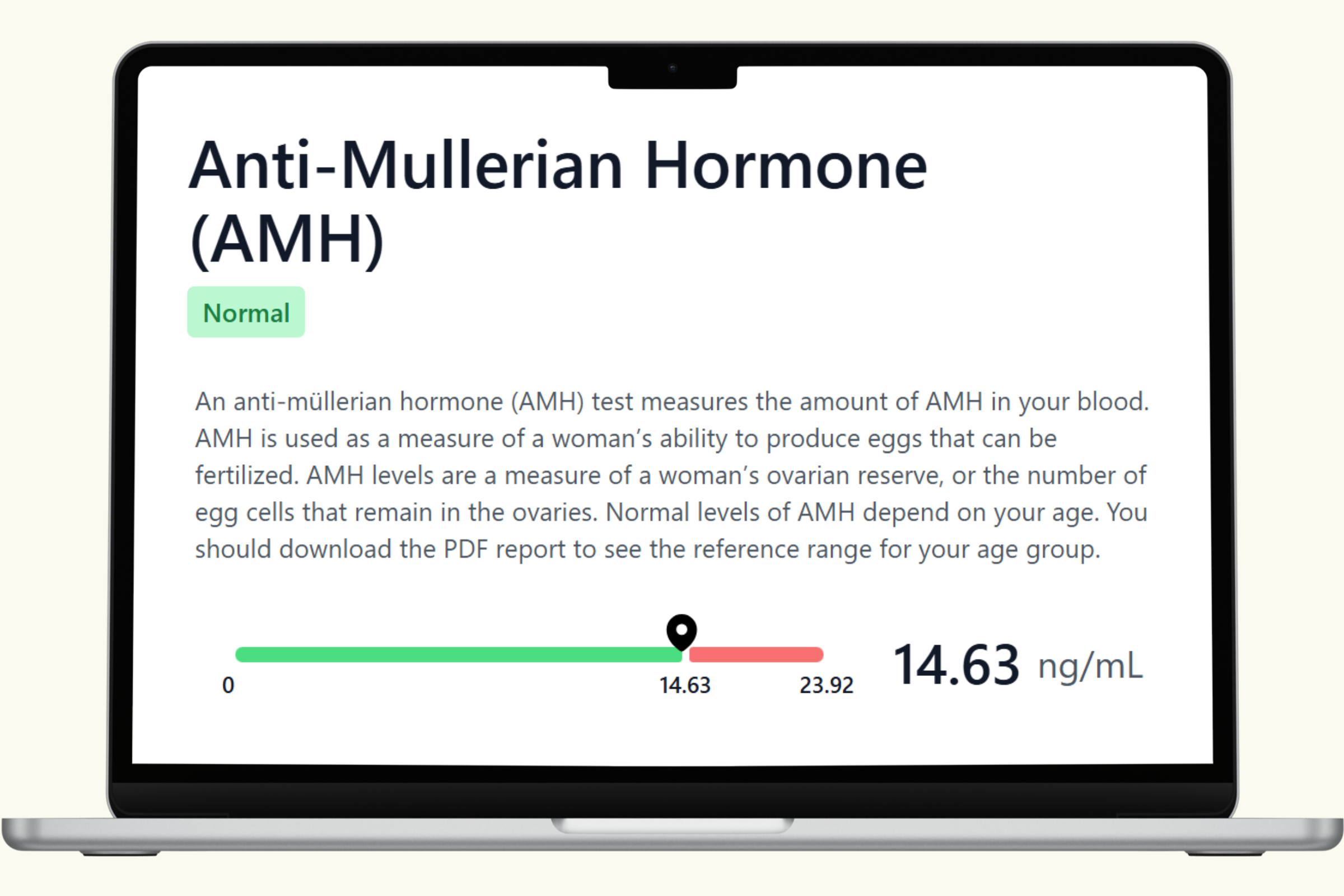Anti-Müllerian Hormone (AMH) Blood Test: A Reliable Marker of Ovarian Reserve
The Anti-Müllerian Hormone (AMH) Blood Test, included in the PlexusDx Women’s Fertility Blood Test, is one of the most accurate and reliable ways to measure a woman’s ovarian reserve—an estimate of how many eggs remain in the ovaries. AMH is produced by granulosa cells in ovarian follicles, and its levels provide important insights into fertility potential, response to fertility treatments, and even the likely timing of menopause. Because AMH levels are stable throughout the menstrual cycle, the test can be performed on any day, making it one of the most convenient and dependable fertility biomarkers.
What is AMH?
Anti-Müllerian Hormone is secreted by small, growing ovarian follicles. Unlike hormones that fluctuate daily or monthly, AMH reflects the size of the “resting pool” of follicles. Since women are born with all the eggs they will ever have, AMH serves as a snapshot of how many remain at a given time. This makes AMH especially valuable for fertility planning and reproductive decision-making.
Why Test AMH?
Doctors order AMH testing for a variety of reasons, including:
- Assessing ovarian reserve: To estimate remaining egg supply and overall reproductive potential.
- Evaluating fertility challenges: Low AMH can help explain difficulty conceiving.
- Planning fertility treatments: AMH helps predict how the ovaries may respond to medications used in IVF or egg retrieval cycles.
- Estimating menopause timing: Declining AMH levels provide an early indicator of perimenopause or approaching menopause.
- Diagnosing reproductive conditions: High AMH levels may be associated with polycystic ovary syndrome (PCOS).
Reference Ranges for AMH
AMH levels vary by age, but general reference values include:
- High AMH (>4.0 ng/mL): May suggest PCOS or high ovarian reserve
- Normal AMH (1.0 – 4.0 ng/mL): Indicates healthy ovarian reserve for most reproductive-age women
- Low AMH (0.3 – 1.0 ng/mL): Suggests reduced ovarian reserve, which may affect fertility
- Very low AMH (<0.3 ng/mL): Often associated with diminished ovarian reserve or nearing menopause
Unlike FSH or estradiol, which vary throughout the cycle, AMH is steady, making it one of the most reliable markers for evaluating fertility at any time.
How AMH Affects Fertility
AMH is not just about egg quantity—it also provides insights into reproductive timing and treatment response:
- Egg supply: Higher AMH indicates more available eggs, while lower AMH suggests fewer remaining.
- Fertility treatment response: AMH levels help doctors predict how many eggs a woman might produce during IVF stimulation cycles.
- Menopause prediction: Declining AMH can signal reduced ovarian reserve years before menopause begins.
- PCOS diagnosis: Women with PCOS often have elevated AMH due to the large number of immature follicles present.
Symptoms of Abnormal AMH Levels
Although AMH itself does not cause symptoms, abnormal levels can be linked to reproductive issues:
- Low AMH: May be associated with infertility, irregular periods, or early menopause.
- High AMH: Often linked to PCOS, which may present with irregular cycles, acne, excess hair growth, or weight gain.
AMH vs. Other Fertility Hormones
AMH offers unique advantages compared to other reproductive hormones:
- FSH: Must be measured on day 3 of the cycle and fluctuates monthly, while AMH can be tested anytime.
- Estradiol: Provides information about egg development in a given cycle, but not long-term ovarian reserve.
- LH: Reflects ovulation timing but does not indicate egg quantity.
By combining AMH with these other hormones, a complete picture of fertility and ovarian health emerges.
Specimen Collection with PlexusDx
The AMH Blood Test through PlexusDx uses an at-home dried blood spot collection with an ADX card. A quick finger prick provides a few drops of blood, which are applied to the collection card and mailed back to the lab. This method ensures accurate and reliable results without the need for a clinic visit.
Benefits of AMH Testing with PlexusDx
- Convenient at-home collection: No office visit or lab appointment needed.
- Reliable at any cycle day: AMH levels remain steady throughout the menstrual cycle.
- Comprehensive fertility panel: AMH is tested alongside FSH, LH, estradiol, TSH, and Free T4 for a full fertility assessment.
- HSA/FSA eligible: Pay with pre-tax healthcare dollars.
- Actionable insights: Results help guide family planning, fertility treatments, or proactive reproductive decisions.
Next Steps if AMH Levels Are Abnormal
If AMH results are outside the normal range, your healthcare provider may recommend:
- Further testing: Additional hormone panels or ultrasound imaging of the ovaries.
- Fertility planning: Strategies may include egg freezing, IVF, or adjusting treatment protocols based on AMH response.
- Medical evaluation: Checking for PCOS or premature ovarian insufficiency if AMH is significantly abnormal.
- Lifestyle support: Healthy weight management, balanced nutrition, and stress reduction can help optimize reproductive health.
Conclusion
The Anti-Müllerian Hormone (AMH) Blood Test is one of the most valuable tools in modern fertility evaluation. By reflecting ovarian reserve and reproductive potential, AMH testing helps women understand their fertility window, anticipate treatment response, and make informed decisions about family planning. As part of the PlexusDx Women’s Fertility Blood Test, AMH provides reliable, at-home insights into ovarian health—empowering women to take control of their reproductive future.

Share:
Luteinizing Hormone (LH) Blood Test
Prolactin (PRL) Blood Test